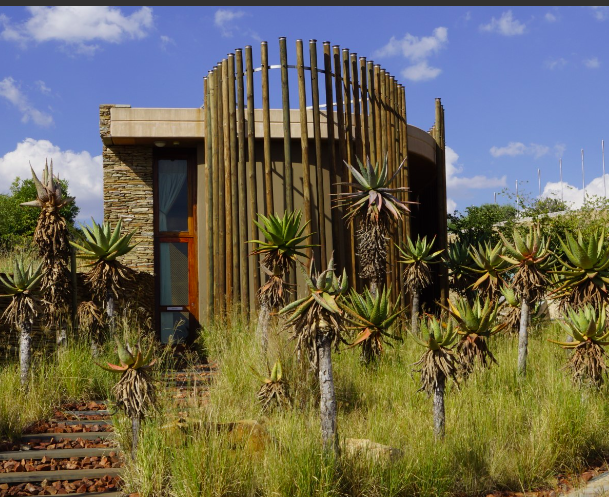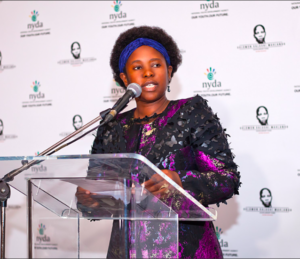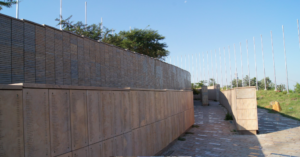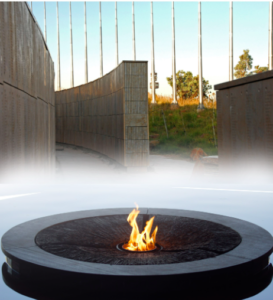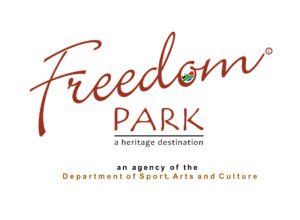In 1999, Freedom Park Patron-in-Chief Dr Nelson Mandela said “the day should not be far off, when we shall have a people’s shrine, a Freedom Park, where we shall honour with all the dignity they deserve those who endured pain so we should experience the joy of freedom”, and thus Freedom Park was born as a national and international icon of humanity and freedom.
Jane Mufamadi has been CEO of Freedom Park for almost seven years. She has, however, been heavily involved in the institution since its inception, first as Co-ordinator for Special Projects and then as the Head of the CEO’s office. During this time, she also headed the Incubation and Innovation department. Then, in 2013, she was appointed as the Head of Heritage and Knowledge department, followed by being appointed as the Acting CEO in September 2014. Mufamadi believes that working at Freedom Park is a life calling; one that offers a rare opportunity to contribute in rebuilding the South African nation.
Her vision is to make Freedom Park visible, thereby growing its number of visitors. Teamwork, focus and accountability are the hallmark of how it does things. There is greater visibility of Freedom Park, and the park is on demand from other museums in South Africa and foreign governments to share its experience of a park dedicated to peace and freedom.
“We have implemented several key partnerships with like-minded institutions,” says Mufamadi. “Freedom Park is one of the few institutions that deal with sensitive issues of politics and history, but which enjoy legitimacy across the wide spectrum of society.”
Unlike other traditional museums and memorials – and as a first of its kind, nationally and internationally – Freedom Park’s approach to knowledge production is distinct. It integrates history, heritage, culture and spirituality, and is anchored within the Indigenous Knowledge Systems perspective. This is truly African: an African story, told by Africans themselves, from an African perspective, thus emancipating the African voice. As a symbol of reconciliation, Freedom Park provides a space for healing past wounds. The storyline, the architecture, the landscape and the ambience all create an environment for deep contemplation and physical and spiritual spaces for healing. One cannot visit Freedom Park and leave unchallenged.
Perched on the Salvokop Hill in Tshwane, Freedom Park is a one-stop heritage site that tells an interwoven tale of South Africa’s unique culture, heritage and spirituality. Without prejudice, it reflects who we are, where we’ve come from, and where we want to go as a nation.
Everything at Freedom Park is representative of South Africa’s history, heritage, culture, spirituality and indigenous knowledge. Even the 360° view of the capital city from Salvokop Hill symbolises a link between the past, present and future. From there one can see the Voortrekker Monument – a reflection of the past; the Union Buildings – South Africa’s current governance; and UNISA’s Centre of Knowledge – engendering a sense of knowledge and development for the future.
Freedom Park is a monument to human rights, dignity and freedom, and a memorial to those who sacrificed their lives to secure liberty. It tells the South African and African story, dating back 3.6 billion years to the dawn of humanity, through the rise of African civilisations, colonialism, the struggle against apartheid, and on to present-day democracy. It is primarily a cultural institution comprising a series of memorial sites that express the common themes of humanity and freedom. Compelling and distinctive African architecture, archives, landscaping, sculpture and imagery explain the history and heritage of the region.
Freedom was not free. Freedom Park emanates from fulfilling a recommendation of the Truth and Reconciliation Commission, which outlined a need for a memorial to remind the nation that our freedom was not free. Freedom Park fulfils this mandate to contribute towards healing and nation building. Freedom Park is about transforming individual pain into a shared national pain.
STORYTELLING
Freedom Park’s elements are particularly special, reflecting the nation’s diversity, using names from languages spoken in South Africa – and not only official languages. It also adopted names from heritage languages, for example, the name of the museum is //hapo, which means dream.
“//Hapo ge //hapo tama /hapo hasib dis tamas kaibo” is a Khoi proverb that means “a dream is not a dream until it is shared by the entire community.” This is central to the message told at Freedom Park. “At our museum, we recount the rich and colourful story of South Africa through what we call epochs. These epochs chart events that have changed the course of history in Africa and particularly in South Africa.” They include an African perspective on the origins of the universe; African innovations and the many vibrant civilisations and ideas that have influenced developments in the modern world; resistance and colonisations, industrialisation and urbanisation; nationalisms and struggle; and, finally nation and continent building.
AWARD-WINNING LOCATION
Besides visiting Freedom Park for a tour, or to spend time learning, reflecting and praying, it is also the perfect location for corporate functions and retreats, picnics and even concerts. This beautiful and inspiring venue offers state-of-the-art technology and facilities, as well as a peaceful space for walking, hiking and bird watching. When at Freedom Park you’ll forget you’re in the city centre. Freedom Park was voted among the top 10 architecturally outstanding museums in the world and Pretoria’s best heritage destination. This is testament to the beauty and uniqueness of Freedom Park.
It’s also important to note that Freedom Park’s message is told from a multicultural perspective. It is not biased towards one nationality but rather to a diverse community, both black and white.
“Freedom Park is not a place for guilt; it’s a place to celebrate our collective achievement. It’s a story of hope, persistence and of the triumph of the human spirit. S’khumbuto, a siswati word meaning memorial, bears testimony to the various conflicts that shaped present-day South Africa and remembers those who died during these struggles. It comprises six symbolic elements, the main being the Wall of Names – a 697m-long wall that is currently inscribed with 85,000 names of those who played a significant role in the eight conflicts that have shaped South Africa,” says Mufamadi.
“It is also important to know that in honouring and remembering these heroes, we’ve been deliberately inclusive. We’re telling the story of reconciliation and unity, and honouring all those who died for freedom, and the persistence and triumph of the human spirit.”
DIALOGUE WITH THE ELDERS
Understanding who we are and where we come from is central to activities at Freedom Park. Our elders have gifted us our beautiful heritage and the freedom we appreciate today. Without their wisdom we will lose a link with our own identities and our own heritage. Freedom Park has a programme called “Youth in Dialogue with the Elders”, where it creates opportunities for young people to engage with the elders and learn about their heritage. The elders also played a significant role in the design of Freedom Park. It established an Indigenous Knowledge Committee, comprising elders from different communities.
THE HEART AND SOUL OF SOUTH AFRICA
The institution believes Freedom Park is the voice of the South African people. Bringing together threads of the nation’s unique culture, heritage, history and spirituality, Freedom Park weaves together the previously untold South African story. Freedom Park reflects the heart and soul of South Africa, captured in one breathtaking space. For that reason, all South Africans are encouraged to visit.
CELEBRATING RECONCILIATION DAY, 16 DECEMBER 2023
Freedom Park was called on to contribute to healing the land and its people, but it would also do more than that. It has become a place of national and continental pride. For more than five centuries the history, culture and spirituality of this continent has been suppressed, distorted and silenced.
The Day of Reconciliation acts as a catalyst for reconciliation and nation building. South Africa’s first democratically elected President and the Patron-in-Chief of Freedom Park, Dr Nelson Mandela, captured the essence of this day in his address on Nation Reconciliation Day, 16 December 1995: “There are few countries which dedicate a national public holiday to reconciliation. But then there are few nations with our history of enforced division, oppression and sustained conflict. And fewer still, which have undergone such a remarkable transition to reclaim their humanity. This Day of Reconciliation celebrates the progress we have made; it reaffirms our commitment; and it measures the challenges.”
+27 (0)12 336 4000
www.freedompark.co.za

